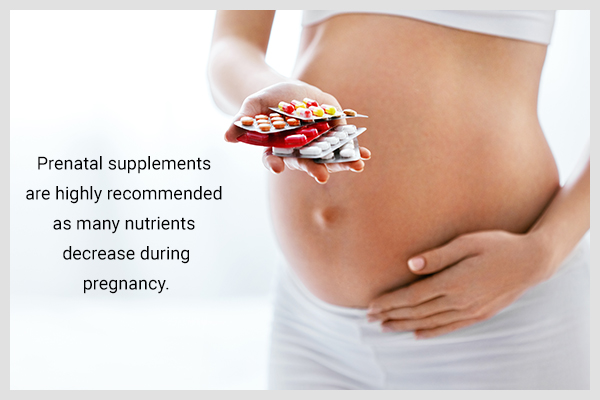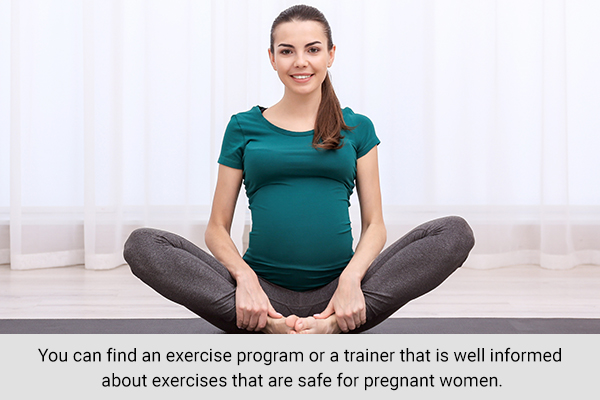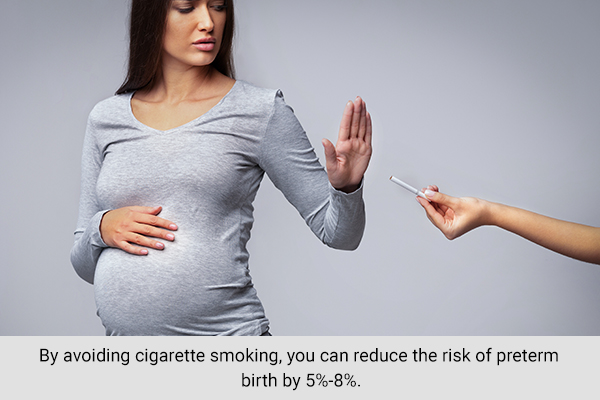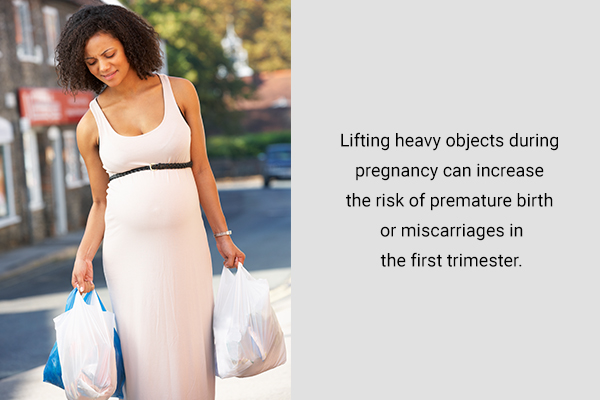In this article:
Pregnancy and childbirth are considered to be a revered life function by women. It is a happy time for many couples, and any complication during the pregnancy can cause severe distress to the mother and even the child.

For this reason, it is critical to follow steps that will aid a healthy pregnancy and birth of a child.
Tips to Ensure a Healthy Pregnancy
These measures will help maintain the health of the pregnant woman and her baby.
1. Eat the right foods
A balanced diet is important for everyone but most important for a pregnant woman who is undergoing great physiological change.
Some cultures believe pregnant women are “eating for two” and attempt to overfeed them. This leads to unhealthy weight gain that can cause complications during pregnancy and difficulty in childbirth. (1)
The focus should instead be on “eating right” with a steady 300–500 increase in daily calories each trimester. Include a variety of foods rich in nutrients.
Make sure you eat fresh foods such as green leafy vegetables, fiber-rich fruits, whole grains, fish, eggs, healthy fats (like omega-3 fatty acids), nuts, and seeds. (2)
- Eat foods rich in calcium and vitamin D such as milk and milk products, soy, and well-cooked fish.
- Consume folate-rich foods such as green leafy vegetables, lentils, and fortified cereals.
- Ensure you drink plenty of water (6–8 ounce glasses per day).
- Fiber-rich foods are also important to avoid constipation. Choose whole grains, high-fiber fruits, and vegetables. (3)
2. Take prenatal supplements

Prenatal supplements are highly recommended as many nutrients decrease during pregnancy.
A prenatal supplement includes calcium, zinc, iron, magnesium, selenium, iodine, and magnesium. Supplementing with these nutrients can reduce complications such as anemia, gestational diabetes, miscarriages, pre-eclampsia (high blood pressure during pregnancy), and hyperthyroidism. (4)
Since the amount of nutrients varies in prenatal supplements, consult your doctor to identify the correct combination and dosage suitable for you.
3. Prioritize rest
Bed rest and a reduction of activity are recommended for about 20% of pregnant women to prevent the negative outcomes of a high-risk pregnancy. (5)
A pregnancy can exhaust the expecting mother, and studies have found daily rest to reduce the risk of pre-eclampsia. (6)
A nap or two throughout the day can be an easy addition to your pregnancy routine.
4. Practice self-care
Self-care techniques such as spending time doing something you love, journaling, spending time with friends and family, and taking nature walks can all be effective strategies for reducing stress. (7)
Stress has been known to cause disruptions in hormones and the immune status during pregnancy, resulting in an increased risk of preterm birth. Since expecting mothers are more likely to experience depressive disorders and high anxiety, (8) practicing ways to manage stress is extremely important.
5. Do pregnancy-safe exercises

While rest is encouraged for pregnant women, exercise is also important. Starting a suitable exercise program early can prevent complications such as diabetes and high blood pressure and can keep weight at a healthy level. (9)
You can find an exercise program or a trainer that is well informed about exercises that are safe for pregnant women.
6. Practice precautions
Just as it is important to consume a healthy diet and include foods that will provide the right nourishment to the growing fetus and pregnant women, avoiding certain foods must also be done to reduce the risk of infections or illnesses.
Health agencies around the world recommend avoiding unpasteurized milk and its products, processed meats, raw egg, fish, and shellfish. (10)
The consumption of caffeine is also to be avoided in those with high intakes. (3)
7. Make changes to household products
Household care products such as cleaners, cosmetic products, perfumes, and lotions used by women can increase exposure to chemicals that are potentially harmful to pregnancy. They can disrupt hormones or increase the risk of asthma and other neurobehavioral problems in the child. (11)
You can replace these cleaners with natural alternatives such as bio enzymes that have antimicrobial properties (12) and lemon and baking soda cleaners.
8. Avoid smoking

By avoiding cigarette smoking, you can reduce the risk of preterm birth by 5%–8%, rupture of membrane in the fetus, tearing of the placenta, congenital issues of the mouth (cleft lip and palate), and heart, limb, and gastrointestinal effects. (13)
The toxins in tobacco can also lead to respiratory disorders, hyperactivity, and even obesity. (13)
9. Avoid alcohol
Alcohol use is another cause of complications for the baby as well as the pregnant mother. It can lead to impaired growth, stillbirths, and fetal alcohol syndrome. (14)
10. Do not consume over-the-counter medication
Even if you are not a stranger to the consumption of over-the-counter medication, many of them are contraindicated for use in pregnancy. Using medications without proper care can lead to birth defects in the baby. (15)
In addition, avoid herbal medications or home remedies as these may have contraindications and may harm the baby. It is better to consult a doctor for prescription medications.
ALSO READ: 13 Pregnancy Myths That You Should Know About
Most-Asked Questions About a Healthy Pregnancy
How can I know I have a healthy pregnancy?
Record your weight gain and the growth of your baby at each doctor’s visit. Consistency in growth patterns can be a good measure to know that you have a healthy pregnancy.
What steps can I take to prepare myself for a healthy pregnancy?
Read books to prepare yourself, consult a doctor to identify healthy growth patterns, and educate yourself. It is also worthwhile to consider a visit to the dietitian to identify a diet plan suitable for you and any health conditions you may have.
Should I avoid lifting heavy objects during pregnancy?

Lifting heavy objects during pregnancy can increase the risk of premature birth or miscarriages in the first trimester. Later on, if the pregnant mother experiences contractions or bleeding, they are discouraged from lifting heavy things.
Should I travel?
Most women are not discouraged from traveling unless their due date is too close. However, certain complications may prevent you from doing so. Consult your doctor to identify your safety.
Final Word
Every expecting mother is faced with some stress about the outcomes of her pregnancy as well as childbirth. With a myriad of information available, it can be overwhelming to figure out the appropriate changes to make.
However, certain basic changes involving the consumption of a healthy diet and taking supplements that can prevent nutrient deficiencies, as well as avoiding alcohol, smoking, and raw eggs, fish, and shellfish, can improve the outcomes of pregnancy by a whole lot.
- Was this article helpful?
- YES, THANKS!NOT REALLY


